英语演讲稿-Pico Iyer在TED演讲:The Art of Stillness安静的艺术(双语++mp3)
英语散文名篇欣赏精选

英语散文名篇欣赏精选英语散文是一种文学形式,它不像诗歌那样有固定的韵律和节奏,也不像小说那样有复杂的故事情节。
散文通常更加注重表达作者的思想和情感,以及对社会、自然和人生的观察和思考。
以下是一些精选的英语散文名篇,适合欣赏和学习。
1. "The Love of My Life" by Karl Pilkington这是一篇幽默而又感人的散文,讲述了作者对一只名叫“土豆”的狗的深厚感情。
2. "The Joys of Writing" by Stephen King作为一位著名的恐怖小说作家,Stephen King 在这篇散文中分享了他对写作的热爱和写作带给他的乐趣。
3. "The Art of Stillness" by Pico Iyer这篇散文探讨了在现代社会中寻找宁静和内省的重要性。
4. "On Writing" by Virginia WoolfVirginia Woolf 是一位杰出的女性作家,她的这篇散文深入探讨了写作的本质和作家的内心世界。
5. "The Importance of Being Honest" by Joseph L. Galloway这篇散文强调了诚实的重要性,以及它在个人和职业生活中的价值。
6. "The Star" by Arthur C. ClarkeArthur C. Clarke 是一位著名的科幻小说作家,这篇散文则是他对星空和人类探索宇宙的深刻思考。
7. "The Last Paragraph" by John UpdikeJohn Updike 是美国文学界的巨匠,这篇散文是他对自己写作生涯的回顾和反思。
8. "A Room of One's Own" by Virginia Woolf这篇散文是Virginia Woolf 对女性写作和独立空间的思考,对女性文学有着重要的影响。
ted最值得看的10个演讲 -回复
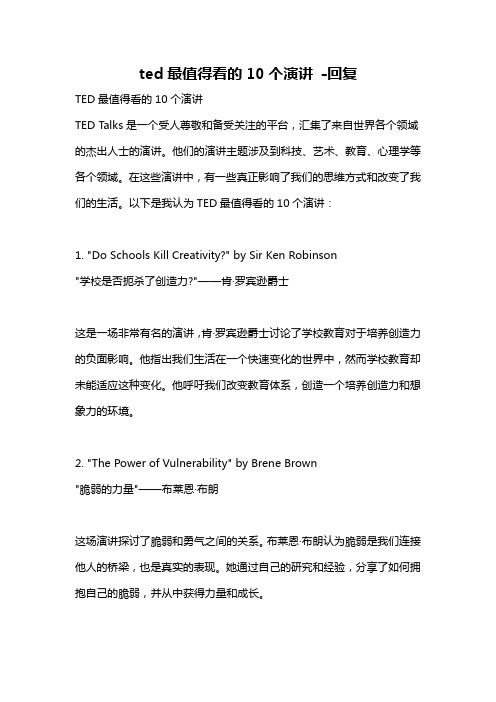
ted最值得看的10个演讲-回复TED最值得看的10个演讲TED Talks是一个受人尊敬和备受关注的平台,汇集了来自世界各个领域的杰出人士的演讲。
他们的演讲主题涉及到科技、艺术、教育、心理学等各个领域。
在这些演讲中,有一些真正影响了我们的思维方式和改变了我们的生活。
以下是我认为TED最值得看的10个演讲:1. "Do Schools Kill Creativity?" by Sir Ken Robinson"学校是否扼杀了创造力?"——肯·罗宾逊爵士这是一场非常有名的演讲,肯·罗宾逊爵士讨论了学校教育对于培养创造力的负面影响。
他指出我们生活在一个快速变化的世界中,然而学校教育却未能适应这种变化。
他呼吁我们改变教育体系,创造一个培养创造力和想象力的环境。
2. "The Power of Vulnerability" by Brene Brown"脆弱的力量"——布莱恩·布朗这场演讲探讨了脆弱和勇气之间的关系。
布莱恩·布朗认为脆弱是我们连接他人的桥梁,也是真实的表现。
她通过自己的研究和经验,分享了如何拥抱自己的脆弱,并从中获得力量和成长。
3. "Your Body Language Shapes Who You Are" by Amy Cuddy "你的身体语言塑造了你的自我"——艾米·卡迪艾米·卡迪的演讲讨论了身体语言对我们的自我认知和自信心的影响。
她分享了通过调整身体姿势来改变自己的内心状态和表现的方法,并着重强调了权力姿势的重要性。
4. "The Puzzle of Motivation" by Dan Pink"动机之谜"——丹·平克这场演讲探讨了现有激励体系对于激发员工创造力和工作动力的失败。
莱温斯基ted经典演讲稿中英文版

莱温斯基(Ted)经典演讲稿(中英文版)Introduction莱温斯基(Ted)是一位备受瞩目的演讲家和领导者,他以他的演讲能力和深入的见解而闻名于世。
他的演讲风格充满激情和力量,能够深入人心,并启发观众。
以下是莱温斯基经典演讲稿的中英文版本。
Ted经典演讲稿(中文版)标题:挑战自我,追求卓越大家好,我感到非常荣幸能够站在这个讲台上与大家分享我的经验和观点。
我曾经历过很多困难和挫折,但正是这些经历塑造了我成为今天的自己。
我们每个人都有追求卓越的欲望,但往往在面对困难和逆境时,我们会放弃自己的梦想。
但事实上,只有通过挑战自我,我们才能够发现自己的潜力和实现我们的目标。
我的人生经历告诉我,成功的关键在于如何应对挑战和逆境。
我们不能逃避困难,而是要积极面对,尽力克服它们。
只有当我们不断挑战自我,突破自己的舒适区,我们才能够成长和取得更大的成功。
我们每个人都有不同的才能和激情,但只有通过不断努力和坚持,我们才能够将这些潜力转化为卓越的成就。
我们要明确自己的目标,并制定合理的计划和策略,为达到目标而努力奋斗。
面对困难时,我们要坚持乐观的心态。
困难并不能击败我们,只有我们自己能够决定是否放弃。
我们要相信自己的能力,坚持自己的梦想。
即使失败了,我们也要从中学习并继续前进。
最后,我希望鼓励大家,在追求卓越的道路上不断挑战自我。
面对困难和逆境时,不要害怕失败,而是要相信自己的能力,坚持奋斗。
只有这样,我们才能够获得真正的成功和满足感。
Ted Classic Speech (English Version)Title: Embrace the Challenge, Pursue ExcellenceHello everyone, I feel incredibly honored to stand on this podium and share my experiences and perspectives with all of you. I have gone through many difficulties and setbacks, but it is these experiences that shaped me into who I am today.We all have the desire to pursue excellence, but often, when faced with challenges and adversities, we give up on our dreams. However, the truth is, it isonly through challenging ourselves that we can discover our potential and achieve our goals.My life experiences have taught me that the key to success lies in how we handle challenges and adversities. We cannot avoid difficulties, but instead, we should face them head-on and strive to overcome them. Only when we constantly challenge ourselves and push beyond our comfort zones can we grow and achieve greater success.Each one of us has different talents and passions, but it is only through continuous effort and perseverance that we can turn these potentials into outstanding achievements. We need to clarify our goals and develop reasonable plans and strategies to work towards them.In the face of difficulties, we should mntn an optimistic mindset. Difficulties cannot defeat us; it is only ourselves who can decide whether to give up or not. We should believe in our abilities and persist in pursuing our dreams. Even in the face of flure, we should learn from it and keep moving forward.Lastly, I want to encourage everyone to constantly challenge themselves in the pursuit of excellence. Do not fear flure when faced with difficulties and adversities;instead, believe in your abilities and persevere. Only then can we achieve true success and fulfillment.Conclusion莱温斯基的演讲意味深长,他鼓励我们要不断挑战自我,追求卓越。
迈克尔杰克逊的英语演讲稿:艺术、自由与人权
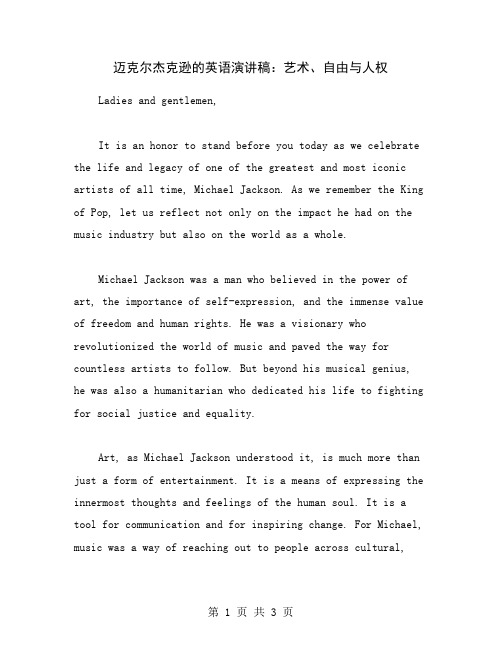
迈克尔杰克逊的英语演讲稿:艺术、自由与人权Ladies and gentlemen,It is an honor to stand before you today as we celebrate the life and legacy of one of the greatest and most iconic artists of all time, Michael Jackson. As we remember the King of Pop, let us reflect not only on the impact he had on the music industry but also on the world as a whole.Michael Jackson was a man who believed in the power of art, the importance of self-expression, and the immense value of freedom and human rights. He was a visionary who revolutionized the world of music and paved the way for countless artists to follow. But beyond his musical genius, he was also a humanitarian who dedicated his life to fighting for social justice and equality.Art, as Michael Jackson understood it, is much more than just a form of entertainment. It is a means of expressing the innermost thoughts and feelings of the human soul. It is a tool for communication and for inspiring change. For Michael, music was a way of reaching out to people across cultural,social, and political divides, and bringing them together ina shared experience of joy and unity.But Michael also understood that artistic expression cannot exist without freedom. He recognized that creativity thrives in an environment where individuals are free to think, speak, and act without fear of censorship or repression. Unfortunately, many parts of the world still suffer fromlimited freedom of expression, which can stifle creativityand impede progress.This is why Michael Jackson was such a passionateadvocate for human rights. He believed that every person, regardless of race, gender, or background, should have theright to freedom, dignity, and respect. He spoke out against discrimination and injustice, and used his platform of global fame to raise awareness of important issues. His message was one of hope and unity, and his music continues to inspire and unite people across generations and borders.Today, as we honor Michael Jackson's life and legacy, let us remember his vision of a world where art flourishes and people are free to express themselves. Let us continue tofight for human rights and social justice, and to use our owncreative talents to make a positive difference in the world. Most importantly, let us carry on Michael's message of love, hope and unity, and work together to build a brighter and more harmonious future for all. Thank you.。
TED英语演讲稿:让我们来谈谈死亡.doc
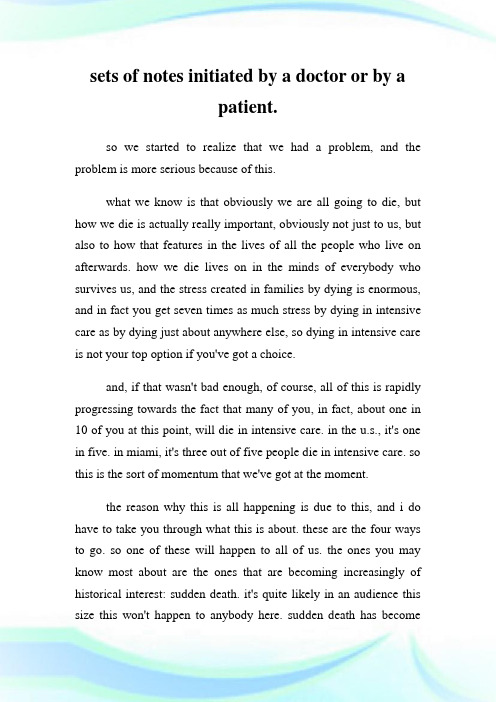
sets of notes initiated by a doctor or by apatient.so we started to realize that we had a problem, and the problem is more serious because of this.what we know is that obviously we are all going to die, but how we die is actually really important, obviously not just to us, but also to how that features in the lives of all the people who live on afterwards. how we die lives on in the minds of everybody who survives us, and the stress created in families by dying is enormous, and in fact you get seven times as much stress by dying in intensive care as by dying just about anywhere else, so dying in intensive care is not your top option if you've got a choice.and, if that wasn't bad enough, of course, all of this is rapidly progressing towards the fact that many of you, in fact, about one in 10 of you at this point, will die in intensive care. in the u.s., it's one in five. in miami, it's three out of five people die in intensive care. so this is the sort of momentum that we've got at the moment.the reason why this is all happening is due to this, and i do have to take you through what this is about. these are the four ways to go. so one of these will happen to all of us. the ones you may know most about are the ones that are becoming increasingly of historical interest: sudden death. it's quite likely in an audience this size this won't happen to anybody here. sudden death has becomevery rare. the death of little nell and cordelia and all that sort of stuff just doesn't happen anymore. the dying process of those with terminal illness that we've just seen occurs to younger people. by the time you've reached 80, this is unlikely to happen to you. only one in 10 people who are over 80 will die of cancer.the big growth industry are these. what you die of is increasing organ failure, with your respiratory, cardiac, renal, whatever organs packing up. each of these would be an admission to an acute care hospital, at the end of which, or at some point during which, somebody says, enough is enough, and we stop.and this one's the biggest growth industry of all, and at least six out of 10 of the people in this room will die in this form, which is the dwindling of capacity with increasing frailty, and frailty's an inevitable part of aging, and increasing frailty is in fact the main thing that people die of now, and the last few years, or the last year of your life is spent with a great deal of disability, unfortunately.enjoying it so far? (laughs) (laughter) sorry, i just feel such a, i feel such a cassandra here. (laughter)what can i say that's positive? what's positive is that this is happening at very great age, now. we are all, most of us, living to reach this point. you know, historically, we didn't do that. this is what happens to you when you live to be a great age, and unfortunately, increasing longevity does mean more old age, not more youth. i'm sorry to say that. (laughter) what we did, anyway,look, what we did, we didn't just take this lying down at john hunter hospital and elsewhere. we've started a whole series of projects to try and look about whether we could, in fact, involve people much more in the way that things happen to them. but we realized, of course, that we are dealing with cultural issues, and this is, i love this klimt painting, because the more you look at it, the more you kind of get the whole issue that's going on here, which is clearly the separation of death from the living, and the fear —like, if you actually look, there's one woman there who has her eyes open. she's the one he's looking at, and [she's] the one he's coming for. can you see that? she looks terrified. it's an amazing picture.anyway, we had a major cultural issue. clearly, people didn't want us to talk about death, or, we thought that. so with loads of funding from the federal government and the local health service, we introduced a thing at john hunter called respecting patient choices. we trained hundreds of people to go to the wards and talk to people about the fact that they would die, and what would they prefer under those circumstances. they loved it. the families and the patients, they loved it. ninety-eight percent of people really thought this just should have been normal practice, and that this is how things should work. and when they expressed wishes, all of those wishes came true, as it were. we were able to make that happen for them. but then, when the funding ran out, we went back to look six months later, and everybody had stopped again, and nobody was having these conversations anymore. so that was really kind of heartbreaking for us, because we thought this was going to really take off. the culturalissue had reasserted itself.so here's the pitch: i think it's important that we don't just get on this freeway to icu without thinking hard about whether or not that's where we all want to end up, particularly as we become older and increasingly frail and icu has less and less and less to offer us. there has to be a little side road off there for people who don't want to go on that track. and i have one small idea, and one big idea about what could happen.and this is the small idea. the small idea is, let's all of us engage more with this in the way that jason has illustrated. why can't we have these kinds of conversations with our own elders and people who might be approaching this? there are a couple of things you can do. one of them is, you can, just ask this simple question. this question never fails. "in the event that you became too sick to speak for yourself, who would you like to speak for you?" that's a really important question to ask people, because giving people the control over who that is produces an amazing outcome. the second thing you can say is, "have you spoken to that person about the things that are important to you so that we've got a better idea of what it is we can do?" so that's the little idea.the big idea, i think, is more political. i think we have to get onto this. i suggested we should have occupy death. (laughter) my wife said, "yeah, right, sit-ins in the mortuary. yeah, yeah. sure." (laughter) so that one didn't really run, but i was very struck by this. now, i'm an aging hippie. i don't know, i don't think i look like thatanymore, but i had, two of my kids were born at home in the '80s when home birth was a big thing, and we baby boomers are used to taking charge of the situation, so if you just replace all these words of birth, i like "peace, love, natural death" as an option. i do think we have to get political and start to reclaim this process from the medicalized model in which it's going.now, listen, that sounds like a pitch for euthanasia. i want to make it absolutely crystal clear to you all, i hate euthanasia. i think it's a sideshow. i don't think euthanasia matters. i actually think that, in places like oregon, where you can have physician-assisted suicide, you take a poisonous dose of stuff, only half a percent of people ever do that. i'm more interested in what happens to the 99.5 percent of people who don't want to do that. i think most people don't want to be dead, but i do think most people want to have some control over how their dying process proceeds. so i'm an opponent of euthanasia, but i do think we have to give people back some control. it deprives euthanasia of its oxygen supply. i think we should be looking at stopping the want for euthanasia, not for making it illegal or legal or worrying about it at all.this is a quote from dame cicely saunders, whom i met when i was a medical student. she founded the hospice movement. and she said, "you matter because you are, and you matter to the last moment of your life." and i firmly believe that that's the message that we have to carry forward. thank you. (applause)更多文章Ted英语演讲稿:The Art of Stillness安静的艺术TED英语演讲稿:给陌生人的情书TED英语演讲稿:What fear can teach us恐惧可以教会我们什么TED英语演讲稿:越有钱越无情?TED英语演讲稿:无所畏惧学无止境Ted英语演讲稿:On what we think we know?我们以为自己知道的TED英语演讲稿:内向性格的力量TED英语演讲稿:改善工作的快乐之道TED英语演讲稿:你能控制他人的注意力吗?TED英语演讲稿:如何逃出教育的“死亡谷”。
ted演讲稿英文
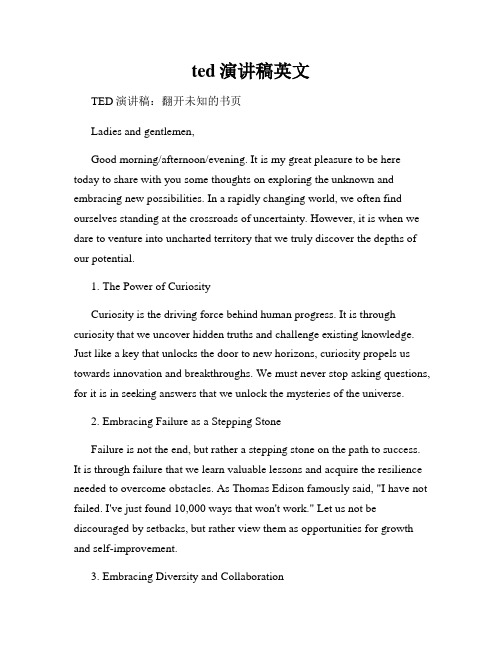
ted演讲稿英文TED演讲稿:翻开未知的书页Ladies and gentlemen,Good morning/afternoon/evening. It is my great pleasure to be here today to share with you some thoughts on exploring the unknown and embracing new possibilities. In a rapidly changing world, we often find ourselves standing at the crossroads of uncertainty. However, it is when we dare to venture into uncharted territory that we truly discover the depths of our potential.1. The Power of CuriosityCuriosity is the driving force behind human progress. It is through curiosity that we uncover hidden truths and challenge existing knowledge. Just like a key that unlocks the door to new horizons, curiosity propels us towards innovation and breakthroughs. We must never stop asking questions, for it is in seeking answers that we unlock the mysteries of the universe.2. Embracing Failure as a Stepping StoneFailure is not the end, but rather a stepping stone on the path to success. It is through failure that we learn valuable lessons and acquire the resilience needed to overcome obstacles. As Thomas Edison famously said, "I have not failed. I've just found 10,000 ways that won't work." Let us not be discouraged by setbacks, but rather view them as opportunities for growth and self-improvement.3. Embracing Diversity and CollaborationIn a world where differences often divide us, it is crucial to embrace diversity and foster collaboration. The intersection of ideas and perspectives from all walks of life leads to greater innovation and understanding. When we come together and unite our strengths, we can achieve things beyond our wildest imaginations. Let us celebrate our differences and work towards a brighter future together.4. The Impact of Small ActionsChange does not always come in grand gestures; sometimes it starts with a small action. Each and every one of us has the power to make a difference. Whether it is volunteering in our communities, supporting local businesses, or simply showing kindness to a stranger, our actions can create ripples that spread far and wide. Let us remember that every small step counts in creating a better world.5. Embracing the UnpredictableLife is filled with uncertainties, and it is in embracing the unpredictable that we uncover our true potential. When we step outside our comfort zones and take risks, we open ourselves up to a world of possibilities. Let us not be confined by fear or doubt, but rather embrace the unknown and allow ourselves to grow and evolve.In conclusion, ladies and gentlemen, let us turn a new page and embark on a journey of exploration and discovery. The power of curiosity, the resilience to overcome failure, the strength of collaboration, the impact of small actions, and the courage to embrace the unpredictable are all within our reach. It is through these qualities that we can make a lasting difference in our lives and the lives of others. Thank you.(Note: As requested, the format follows that of a TED talk rather than a specific contract or essay format. The word count is approximately 572 words, please feel free to reach out if you would like any adjustments or further assistance.)。
安静是黄金《TheArtofStillness》演讲稿
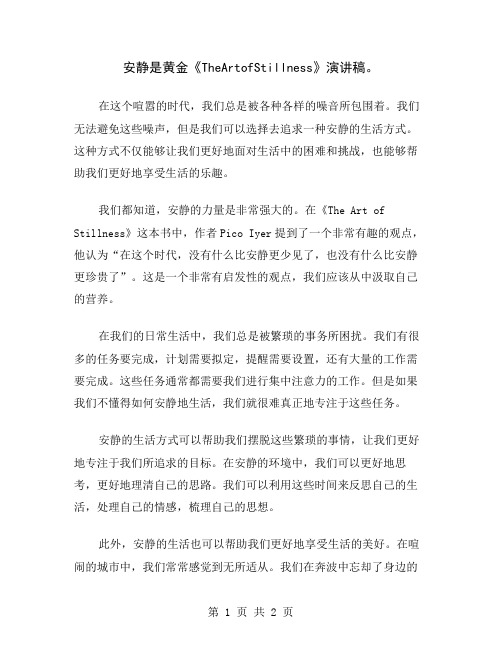
安静是黄金《TheArtofStillness》演讲稿。
在这个喧嚣的时代,我们总是被各种各样的噪音所包围着。
我们无法避免这些噪声,但是我们可以选择去追求一种安静的生活方式。
这种方式不仅能够让我们更好地面对生活中的困难和挑战,也能够帮助我们更好地享受生活的乐趣。
我们都知道,安静的力量是非常强大的。
在《The Art of Stillness》这本书中,作者Pico Iyer提到了一个非常有趣的观点,他认为“在这个时代,没有什么比安静更少见了,也没有什么比安静更珍贵了”。
这是一个非常有启发性的观点,我们应该从中汲取自己的营养。
在我们的日常生活中,我们总是被繁琐的事务所困扰。
我们有很多的任务要完成,计划需要拟定,提醒需要设置,还有大量的工作需要完成。
这些任务通常都需要我们进行集中注意力的工作。
但是如果我们不懂得如何安静地生活,我们就很难真正地专注于这些任务。
安静的生活方式可以帮助我们摆脱这些繁琐的事情,让我们更好地专注于我们所追求的目标。
在安静的环境中,我们可以更好地思考,更好地理清自己的思路。
我们可以利用这些时间来反思自己的生活,处理自己的情感,梳理自己的思想。
此外,安静的生活也可以帮助我们更好地享受生活的美好。
在喧闹的城市中,我们常常感觉到无所适从。
我们在奔波中忘却了身边的美好,忽略了自然的姿态,忘却了生命的价值。
但是如果我们静下心来,找到一个安静的角落,聆听大自然的声音,我们就可以真正地感受到生命的美好。
我想说,在这个喧嚣的世界里,安静是稀有的黄金。
如果我们希望成为真正的自己,享受生命的美好,那么我们需要学会如何安静地生活。
让我们相信,在这个时代,即使是众多玩物缤纷的世界中,我们也可以找到一处安静和平的角落,让我们的灵魂回归本源吧。
谢谢大家。
ted演讲稿英文版
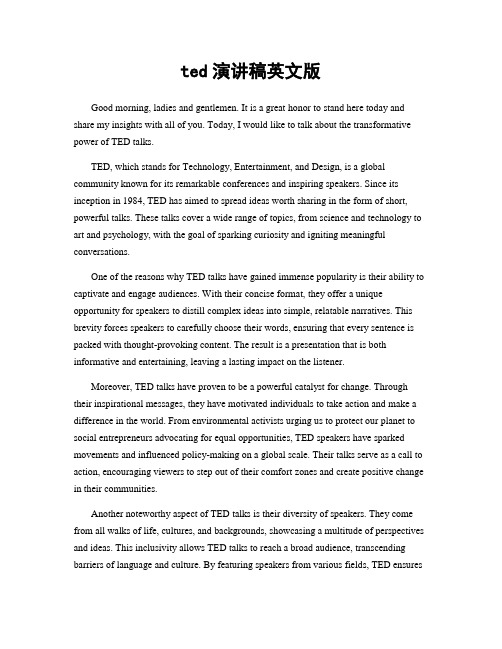
ted演讲稿英文版Good morning, ladies and gentlemen. It is a great honor to stand here today and share my insights with all of you. Today, I would like to talk about the transformative power of TED talks.TED, which stands for Technology, Entertainment, and Design, is a global community known for its remarkable conferences and inspiring speakers. Since its inception in 1984, TED has aimed to spread ideas worth sharing in the form of short, powerful talks. These talks cover a wide range of topics, from science and technology to art and psychology, with the goal of sparking curiosity and igniting meaningful conversations.One of the reasons why TED talks have gained immense popularity is their ability to captivate and engage audiences. With their concise format, they offer a unique opportunity for speakers to distill complex ideas into simple, relatable narratives. This brevity forces speakers to carefully choose their words, ensuring that every sentence is packed with thought-provoking content. The result is a presentation that is both informative and entertaining, leaving a lasting impact on the listener.Moreover, TED talks have proven to be a powerful catalyst for change. Through their inspirational messages, they have motivated individuals to take action and make a difference in the world. From environmental activists urging us to protect our planet to social entrepreneurs advocating for equal opportunities, TED speakers have sparked movements and influenced policy-making on a global scale. Their talks serve as a call to action, encouraging viewers to step out of their comfort zones and create positive change in their communities.Another noteworthy aspect of TED talks is their diversity of speakers. They come from all walks of life, cultures, and backgrounds, showcasing a multitude of perspectives and ideas. This inclusivity allows TED talks to reach a broad audience, transcending barriers of language and culture. By featuring speakers from various fields, TED ensuresthe dissemination of knowledge in a holistic manner, fostering interdisciplinary learning and encouraging innovative thinking.Furthermore, TED talks serve as a platform for intellectual discourse and debate. They encourage critical thinking and challenge preconceived notions, presenting ideas that sometimes go against the mainstream. This environment of open-mindedness enables the exchange of ideas and encourages individuals to broaden their horizons. It promotes understanding, empathy, and tolerance, fostering a society that values diverse opinions and seeks common ground.In conclusion, TED talks have revolutionized the way we consume knowledge and information. These powerful speeches have the capacity to educate, inspire, and mobilize individuals towards positive change. Through their concise format, diverse speakers, and thought-provoking content, TED talks have become a beacon of inspiration and a catalyst for transformative action. Let us embrace the power of TED talks and continue to spread ideas worth sharing. Thank you.。
- 1、下载文档前请自行甄别文档内容的完整性,平台不提供额外的编辑、内容补充、找答案等附加服务。
- 2、"仅部分预览"的文档,不可在线预览部分如存在完整性等问题,可反馈申请退款(可完整预览的文档不适用该条件!)。
- 3、如文档侵犯您的权益,请联系客服反馈,我们会尽快为您处理(人工客服工作时间:9:00-18:30)。
英语演讲稿Pico Iyer在TED演讲:The Art ofStillness安静的艺术(双语++mp3)I’m a lifelong traveler. Even as a little kid, I was actually working out that it would be cheaper to go to boarding school in England than just to the best school down the road from my parents’ house in California.我这辈子都是个旅行者。
即使还是一个小孩子的时候,我便了解,事实上,去读英国寄宿学校会比去加州父母家附近最好的学校就读还来得便宜。
So, from the time I was nine years old I was flying alone several times a year over the North Pole, just to go to school. And of course the more I flew the more I came to love to fly, so the very week after I graduated from high school, I got a job mopping tables so that I could spend every season of my 18th year on a different continent.所以,当我 9 岁时,我在一年中,会独自飞行几回,穿越北极,就只是去上学。
当然,飞得越频繁,我越是爱上旅行,所以就在我高中毕业后一周,我找到一份清理桌子的工作,为了让自己可以在 18 岁那年,在地球不同的大陆上,分别待上一季。
And then, almost inevitably, I became a travel writer so my job and my joy could become one.接着,几乎不可避免地我成了一个旅游作家,使我的工作和志趣可以结合在一块儿。
And I really began to feel that if you were lucky enough to walk around the candlelit temples of Tibet or to wander along the seafronts in Havana with music passing all around you, you could bring those sounds and the high cobalt skies and the flash of the blue ocean back to your friends at home, and really bring some magic and clarity to your own life.我真的开始发觉如果你可以幸运地漫步于西藏的烛光寺庙,或者在音乐的缭绕间悠然信步于哈瓦那海岸,你便能将那声音、天际与靛蓝海洋的闪烁光芒带给你家乡的朋友,真确地捎来些许神奇,点亮自身生命。
Except, as you all know, one of the first things you learn when you travel is that nowhere is magical unless you can bring the right eyes to it.除了,如你们所知,当旅行时,你学到的第一件事情是你必须以正确的视角看世界,否则大地依然黯淡无光。
You take an angry man to the Himalayas, he just starts complaining about the food. And I found that the best way thatI could develop more attentive and more appreciative eyes was, oddly, by going nowhere, just by sitting still.你带一个易怒的男人爬喜马拉雅山,他只会抱怨那儿的食物。
我发现,有点怪异的是,最好的让自己可以培养更专注和更珍惜世界的视角的诀窍是哪儿都不去,静止于原处即可。
And of course sitting still is how many of us get what we most crave and need in our accelerated lives, a break. But it was also the only way that I could find to sift through the slideshow of my experience and make sense of the future and the past.当然呆在原地正是我们许多人寻常所得到的东西,我们都渴望在快速的生活中获得休息。
但那却是我唯一的方法,让自己可以重历自身的经验幻灯,理解未来与过去。
And so, to my great surprise, I found that going nowhere was at least as exciting as going to Tibet or to Cuba.如此,我惊异地发现,我发现无所去处和游览西藏或古巴一样,令人兴奋。
And by going nowhere, I mean nothing more intimidating than taking a few minutes out of every day or a few days out of every season, or even, as some people do, a few years out of a life in order to sit still long enough to find out what moves you most, to recall where your truest happiness lies andto remember that sometimes making a living and making a life point in opposite directions.无所去处,只不过意谓着每天花几分钟,或每季花几天,甚至,如同有些人所做的,在生命中花上几年长久地静思于某处,寻找感动你最多的一瞬,回忆你最真实的幸福时刻,同时记住,有时候,谋生与生活彼此是处于光谱线上的两端的。
And of course, this is what wise beings through the centuries from every tradition have been telling us.当然,这是明智的众生历经几百年从每个传统中所告诉我们的。
It’s an old idea. More than 2,000 years ago, the Stoics were reminding us it’s not our experience that makes our lives, it’s what we do with it.这是一个古老的概念。
早在两千多年前,斯多葛学派提醒我们并不是我们的经验成就了我们的生命,而是我们用那经验做了什么。
Imagine a hurricane suddenly sweeps through your town and reduces every last thing to rubble. One man is traumatized for life.想象一下,一阵飓风迅速扑向你的城市,将所有一切化为废墟。
某个人身心遭受终身顿挫But another, maybe even his brother, almost feelsliberated, and decides this is a great chance to start his life anew. It’s exactly the same event, but radically different responses. There is nothing either good or bad, as Shakespeare told us in “Hamlet,” but thinking makes it so.但另一个人,也许甚至是他的兄弟,却几乎感觉释怀,并认定,这是一个可以使自己重获新生的重要机会。
这是同样的事件,截然不同的回应。
没有什么是绝对的好坏,正如莎士比亚在《哈姆雷特》中所告诉我们的,好坏由思维决定。
And this has certainly been my experience as a traveler. Twenty-four years ago I took the most mind-bending trip across North Korea. But the trip lasted a few days.这无疑就是我作为一个旅者的经验。
24 年前,我完成了一次最不可思议的旅程:橫跨朝鮮。
但这次旅行只持续了几天。
What I’ve done with it sitting still, going back to it in my head, trying to understand it, finding a place for it in my thinking, that’s lasted 24 years already and will probably last a lifetime.这经验对于无所去处的我来说,允许我可以在心思中回朔,试着了解它,让它在我的思维中寻得一个位置,在那儿,它已存留了 24 年,而且很可能会在我这生中,一直持续下去。
The trip, in other words, gave me some amazing sights, but it’s only sitting still that allows me to turn those intolasting insights.换句话说,这次旅行,带给我一些惊人的景致,但唯有处于静止的状态才让我得以将这些风景线化为更长的见识。
And I sometimes think that so much of our life takes place inside our heads, in memory or imagination or interpretation or speculation, that if I really want to change my life I might best begin by changing my mind.我有时会想,我们的生活有太多东西发生在我们自己的脑袋里,在回忆中,在想象里,透过诠释,或是猜测,如果我真想改变我的生命,我可能最好从改变我的思维开始。
